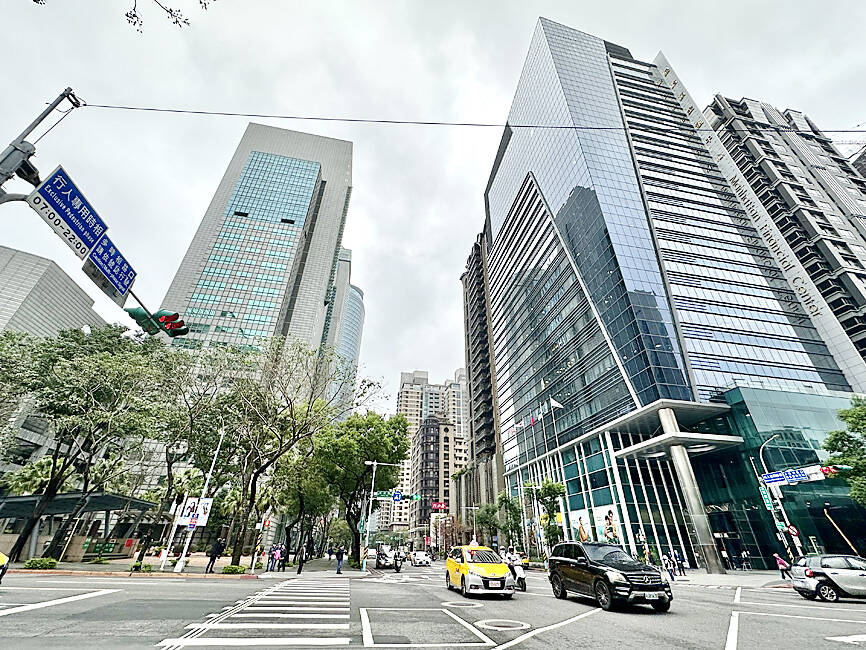Housing agency Hiyes International Co (海悅國際開發) and elevator maker Golden Friends Corp (崇友實業) are expecting stable business growth this year, as the local property market steadily emerges from a slowdown induced by economic uncertainty and tight monetary policy.
Hiyes said business visibility is better this quarter from a year earlier, judging by agency cases and construction revenue.
Things might be quieter during the second quarter of the year, as developers would seek to digest unsold houses and launch major presale projects in the third and fourth quarters that would generate billions of revenue, it said.

Photo: CNA
Hiyes said it is cautiously assessing whether to undertake urban renewal projects in Taipei and New Taipei City in a bid to diversify its income sources and strengthen its competitive edge.
The company in December last year recognized construction revenue of NT$2.47 billion (US$78.02 million) from a mixed-use complex in Taichung, which helped boost net income to NT$1.66 billion for the whole of last year, or earnings per share of NT$13.86.
The results represent a 77.16 percent improvement from 2022 on the back of strong demand after the government in August last year introduced interest subsidies and other favorable lending terms for first-home purchases regardless of the age of the buyer.
Hiyes last week said that it plans to distribute a NT$7 per share in cash dividend and another NT$2 stock dividend from last year’s earnings, equivalent to a payout ratio of 64.9 percent.
Elevator maker Golden Friends last week posted record-high earnings per share of NT$5.06 for last year, up 5.57 percent from a year earlier, thanks to stable demand, maintenance requirements and the divestment of an office building in Kaohsiung.
Revenue last year grew 11.16 percent to NT$5.27 billion, the company said, due to more elevator demand from new residential complexes and office buildings.
The company has proposed distributing a NT$4 per share cash dividend from last year’s earnings, indicating a payout ratio of 80 percent.
The company said it has a guarded, but optimistic view for this year with ample orders on hand that would provide profit momentum.
The company said that it is to introduce artificial intelligence and environment-friendly technologies when developing new elevators.

NEW IDENTITY: Known for its software, India has expanded into hardware, with its semiconductor industry growing from US$38bn in 2023 to US$45bn to US$50bn India on Saturday inaugurated its first semiconductor assembly and test facility, a milestone in the government’s push to reduce dependence on foreign chipmakers and stake a claim in a sector dominated by China. Indian Prime Minister Narendra Modi opened US firm Micron Technology Inc’s semiconductor assembly, test and packaging unit in his home state of Gujarat, hailing the “dawn of a new era” for India’s technology ambitions. “When young Indians look back in the future, they will see this decade as the turning point in our tech future,” Modi told the event, which was broadcast on his YouTube channel. The plant would convert

‘SEISMIC SHIFT’: The researcher forecast there would be about 1.1 billion mobile shipments this year, down from 1.26 billion the prior year and erasing years of gains The global smartphone market is expected to contract 12.9 percent this year due to the unprecedented memorychip shortage, marking “a crisis like no other,” researcher International Data Corp (IDC) said. The new forecast, a dramatic revision down from earlier estimates, gives the latest accounting of the ongoing memory crunch that is affecting every corner of the electronics industry. The demand for advanced memory to power artificial intelligence (AI) tasks has drained global supply until well into next year and jeopardizes the business model of many smartphone makers. IDC forecast about 1.1 billion mobile shipments this year, down from 1.26 billion the prior

People stand in a Pokemon store in Tokyo on Thursday. One of the world highest-grossing franchises is celebrated its 30th anniversary yesterday.

Zimbabwe’s ban on raw lithium exports is forcing Chinese miners to rethink their strategy, speeding up plans to process the metal locally instead of shipping it to China’s vast rechargeable battery industry. The country is Africa’s largest lithium producer and has one of the world’s largest reserves, according to the US Geological Survey (USGS). Zimbabwe already banned the export of lithium ore in 2022 and last year announced it would halt exports of lithium concentrates from January next year. However, on Wednesday it imposed the ban with immediate effect, leaving unclear what the lithium mining sector would do in the